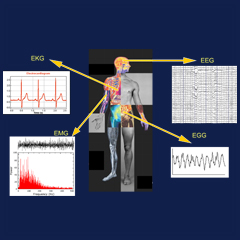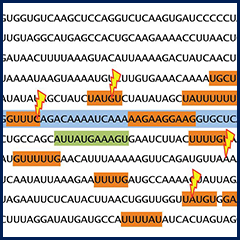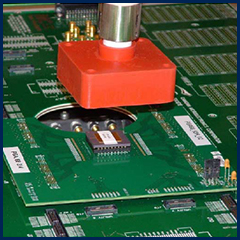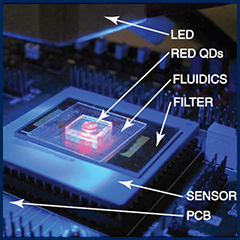Explore groundbreaking research that transforms technology, drives innovation, and fuels the next generation of engineering.
The Edward S. Rogers Sr. Department of Electrical & Computer Engineering at the University of Toronto is a global leader in research, known for its impact in key areas like Biomedical Engineering, Energy Systems, Photonics, and more.
With an active focus on commercialization and real-world application, ECE's research generates solutions to improve lives and shape industries worldwide.
Learn more about our student research opportunities here.
Connect with our faculty, including leaders whose research transforms the fields of electronics, energy systems, photonics, and beyond.
Biomedical Engineering
Biomedical Engineering is a discipline that uses engineering principles and quantitative methods to improve and sustain human health. It is based on the integration of the fundamental concepts of physics, chemistry and biology within an engineering perspective.
Specialities include:
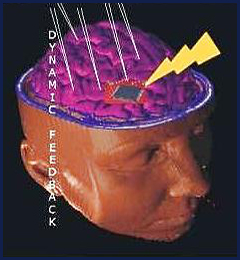
- Bioengineering of the brain
- Neural system modeling and analysis
- Brain–machine interface (BMI)
- Biological signal processing
- Prediction and control of epileptic seizures
- Biological and artificial neural networks
- Computational neuroscience
Researchers
Bardakjian B L, Genov R, Wong W, Yoo P, Zariffa J, Liu X
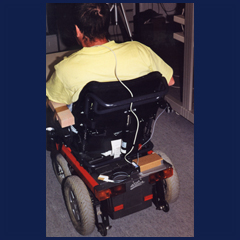
- Neuroprostheses for reaching, grasping, sitting, standing and walking
- Functional electrical stimulation
- Brain-machine interface
- Mobility-enhancing devices
- Gait and movement analysis
Researchers
Zariffa, J, Liu X
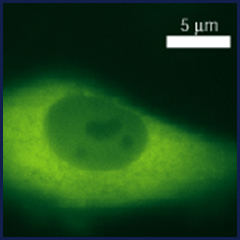
- Magnetic resonance imaging (MRI)
- Ultrasound
- Optical bio sensors based on semiconductor devices and nano-structures
- Cellular imaging
- Inverse problems and partial differential equations arising in medical imaging
Researchers
Levi O, Nachman A, Truong K, Cobbold R S C
Communications
The research interests in Communications fall into three broad categories: communication networks, digital communication and signal processing. Research in communication networks includes areas such as advanced switching concepts, broadband, light wave and local area networks, packet video processing, and queuing theory.
Specialities include:
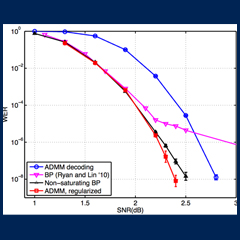
- Coding theory
- Network coding
- Architecture for delay-sensitive communications
- Optimization
- Fibre optics
- Circuit design based on communications theory
Researchers
Draper, S., Khisti, A., Kschischang, F., Yu, W.
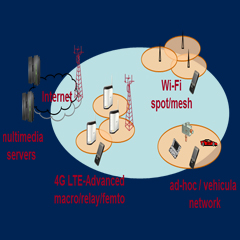
- Heterogeneous networks
- Relay networks
- Vehicular networks
- Autonomous infrastructure
- Energy harvesting
- Sensor networks
- Hybrid public-private spectrum access
- Dynamic spectrum management
Researchers
Adve, R., Hatzinakos, D., Liang, B., Sousa, E., Valaee, S., Yu, W.

- Network architectures and management
- Sustainable infrastructure
- Mobile networking, multimedia streaming
- Network economics
- Vehicular networks
- Protocol design
- SAVI
Researchers
Kundur, D., Leon-Garcia, A., Liang, B., Liebeherr, J., Valaee, S.

- Multimedia, image processing
- Watermarking/DRM
- Camera processing
- Social signal processing
- Radar signal processing
Researchers
Adve, R., Hatzinakos, D., Kundur, D., Kwong, R., Plataniotis, K.
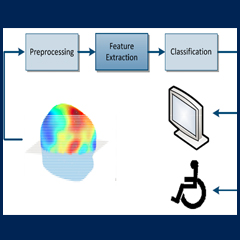
- Body area networks
- ECG/EEG
- Ultrasound
- Rehab and motor imagery detection
- Biomarker and neural feedback
- Emotion/cognition analysis
Researchers
Adve, R., Hatzinakos, D., Plataniotis, K.

- IPSI
- Biometrics and surveillance
- Multimedia security
- Infrastructure security (smart grid)
- Information theoretic security
Researchers
Draper, S., Hatzinakos, D., Khisti, A., Kundur, D., Plataniotis, K.

- Quantum information theory and cryptography - Lo, H-K.
- Smart grid and cyber-physical systems - Kundur, D., Leon-Garcia, A.
- Machine learning and genome biology - Frey, B.
Computer Engineering
Computer Engineering in ECE was established around 1980 and has grown to the present complement of more than 25 professors plus several research associates and technologists, while supporting many dozens of graduate students at any given time. Professors and students in the group are internationally recognized for their state-of-the-art research activity in the design, implementation and use of a wide range of computer software and hardware.
Specialities include:
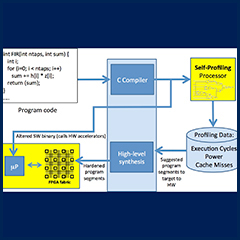
- Compiling for GPUs
- Parallelizing compilers
- Retargetable compilation
- Behavioural synthesis
Researchers
Abdelrahman, T.S., Zhu, J., Brown, S.D., Anderson, J.H.
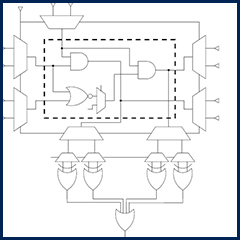
- CAD for FPGAs
- CAD for low power and reliable circuits
- Formal methods, design, silicon debug
- Synthesis
Researchers
Anderson, J.H., Betz, V., Brown, S.D., Rose, J.S., Najm, F.N., Veneris, A., Zhu, J.
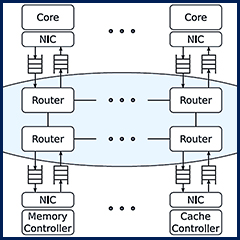
- Microarchitecture
- Interconnection networks
- Parallel architecture
- FPGA-based computing architecture
- Architectural support for security
- VLSI for signal processing
Researchers
Moshovos, A., Enright Jerger, N., Jeffrey M., Abdelrahman, T.S., Brown, S.D., Chow, P., Rose, J.S., Lie, D., Gulak, P.G.
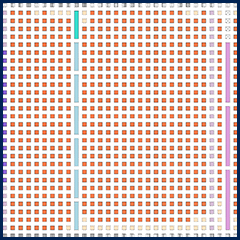
- CAD for FPGAs
- FPGA architecture
- FPGA-based computing
Researchers
Anderson, J.H., Betz, V., Brown, S.D., Rose, J.S., Chow, P.

- Mobile applications
- Mobile security
- Wearable computing
- Image and video processing
- Biomedical cybernetics
- Multi-sensor information systems
Researchers
Aarabi, P., Rose, J.S., Lie, D., Mann, S., Wong, W.
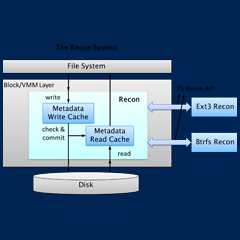
- Distributed systems
- Middleware and information systems
- Quality-of-service provisioning
- Operating systems
- Secure systems
- Data management systems
- Software engineering
Researchers
Jacobsen, H.A., Li, B., Goel, A., Lie, D., Stumm, M., Yuan, D., Papernot, N., Zhou S.
Electromagnetics
Electromagnetics is engaged in electromagnetic field theory and measurement, with emphasis on radiation, propagation and guided-wave phenomena. Research activity covers the range from very low radio frequencies to millimetre waves and quasi-optics.
Specialities include:
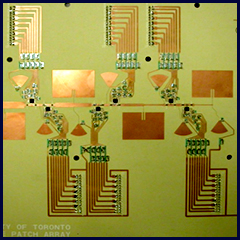
- Signal integrity in high-speed digital systems
- Microwave integrated circuit design, modeling and characterization
Researchers
Eleftheriades, G., Sarris, C., Triverio, P.
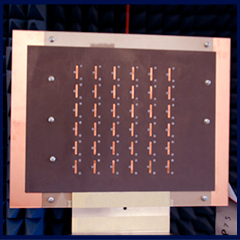
- Wave electronics; integrated, active, MEMS reconfigurable antennas
- Controlled-beam antennas
- Adaptive and diversity antennas
- Ultra-wideband antenna arrays
- Electronically tunable reflectarrays and reconfigurable reflecting surfaces
- Terahertz antennas
Researchers
Eleftheriades, G., Hum, S.
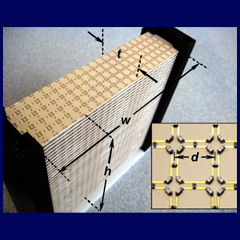
- Negative refraction media, transmission-line metamaterials
- Negative-refractive-index tranmission-line (NRI-TL) metamaterials
- RF/microwave components using metamaterials
- Small metamaterial antennas, focusing and imaging with super-resolution
- Nanostructured and plasmonic metamaterials, metamaterial modelling
Researchers
Eleftheriades, G., Mojahedi, M., Sarris, C.
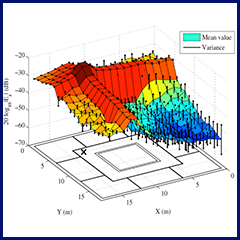
- Computer-aided solution of integral and differential equations
- Method of moments; finite elements; boundary elements
- Finite-difference time-domain, multiresolution time-domain
- Higher order, mesh adaptive techniques
- Wireless channel modelling
Researchers
Sarris, C., Triverio, P.
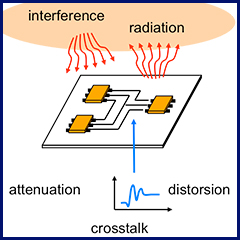
- Compatibility of wireline and wireless communication systems
- Susceptibility/immunity of digital circuits; stress testing electrostatic arc discharges
Researchers
Sarris, C., Triverio, P.
Electronics
Electronics in ECE is one of the largest and oldest department research areas in North America, counting Professors K.C. Smith and Adel Sedra as some of its best-known alumni. Our research covers the entire spectrum of digital, analog, mixed signal and high-frequency electronic devices, as well as integrated circuits and integrated systems on chip from DC to 1THz.
Specialities include:
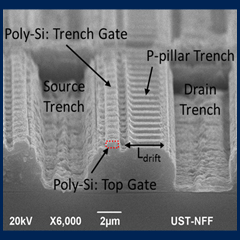
- Nano-materials for energy and sensing
- Atomic-scale and 2-D crystal transistors
- Silicon and GaN power semiconductor devices
Researchers
Sargent, Ng, Voinigescu
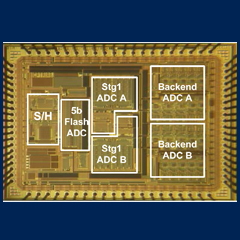
- Data converters
- Power management
- Analog and mixed-signal processing
- MEMS interface circuits and applications
- CMOS imagers
Researchers
Chan Carusone, Genov, Johns, Liscidini, Ng, Sheikholeslami, Voinigescu, Liu
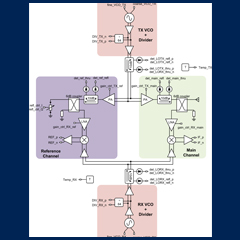
- mm wave circuits and THz
- Optical receivers/transmitters
- Wireless receivers/transmitters
- High-speed SerDes
- DSP-based transceivers
- LNA, PA, modulators, switches, RF DACs and RF circuits
- Baseband signal processing systems
Researchers
Chan Carusone, Gulak, Liscidini, Sheikholeslami, Voinigescu, Liu
Energy Systems
Energy Systems is concerned with the generation, transmission and utilization of electrical energy.
The Energy Systems Group has a critical concentration of expertise in power systems and power electronics for a range of applications. In the power systems area, research activities include electromagnetic transients, power systems control, DC transmission, power quality and system optimization. In the power electronics area, custom ICs are being developed for control and power management for low power converters, while research into higher power converters focuses on novel topologies for enhanced functionality and efficiency. Applications range from miniaturized power supplies through to power conversion systems for renewable energy sources, automotive, aerospace and large utility scaled equipment. Within the electromagnetic area, ongoing research involves low and high frequency magnetic devices, piezoelectric devices and EMI.
Photonics
Photonics is composed of eight professors whose diverse research interests range from theoretical studies to photonics technology. The group’s main research endeavours encompass fibre-optic communication systems and components; fully optical networks; optoelectronic device modelling, design, fabrication, and characterization; photonic crystals and photonic bandgaps; non-linear optics; ultrafast optical phenomena and devices; nanofabrication processes; photonic applications in laser processing; and high-efficiency solar cells.
Specialities include:
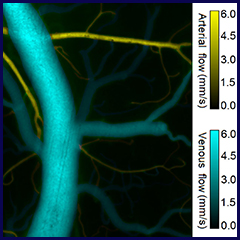
- Bio-imaging
- Bio-sensing
Researchers
Levi, O., Mojahedi, M., Aitchison, J.S., Sargent, E.H., Herman, P.R.
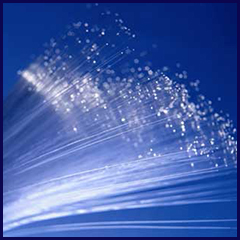
- Fibre-optic sensing
- Fibre-optic metrology
- Lab-on-a-fibre
- Optical communication network
- Quantum communication over fibre
Researchers
Qian, L., Pavel, L., Lo, H.K., Herman, P.R., Aitchison, J.S.
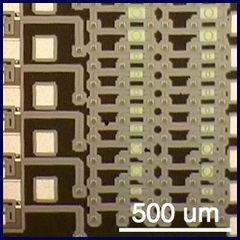
- High-speed optical transmitters and receivers
- 2.5D and 3D electronic-photonic integration
- Nano-scale optical modulators
- Short-reach computer communications
- Photonic and optical coatings
- Single nanowire and quantum-dot-based laser development
Researchers
Poon, J., Kherani, N., Helmy, A., Levi, O., Mojahedi, M., Aitchison, J.S., Herman, P.R., Ruda, H.
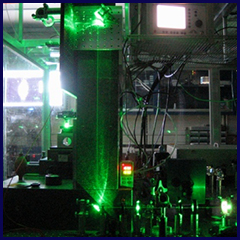
- Controlling laser-matter interaction physics in glasses
- 3D laser writing of optical circuits, optofluidics, nanofluidics
- Structuring "smart" glass: lab-in-fibre, smart catheters, efficient photovoltaics
- Sub-wavelength focusing for probing and shaping our new nano-world
Researchers
Herman, P.R.

- Silicon PV (thin Si, thin film Si)
- Photonic crystals
- Nanowire-based solar cells
- III-Vs on Silicon for PV
- Solution-processed quantum-dot photovoltaics
Researchers
Kherani, N., Sargent, E.H., Ruda, H.

- Light localization
- Coupled plasmonic-photonic effects in nanowires
Researchers
Helmy, A., Levi, O., Mojahedi, M., Kherani, N., Ruda, H.

- Omni-focus video camera
- Omni-focus laparoscope
- Laparoscopic microscope
- Super-deep 3D imaging
- Pulfrich effects for amblyopic diagnosis
Researchers
Iizuka, K.
Systems Control
Systems Control concentrates on the principles, theory and algorithms that underpin the control of dynamical systems. The group’s six researchers develop general frameworks for control design by distilling common features of applications problems.
Specialities include:
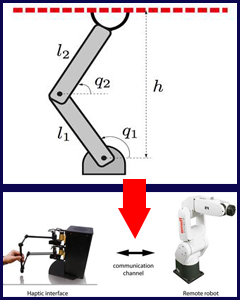
- Nonlinear control
- Game theory
- Linear geometric control
- Input-output operator approach
Researchers
Broucke, M., Kwong, R., Maggiore, M., Pavel, L., Scardovi, L., Davison, E.J.
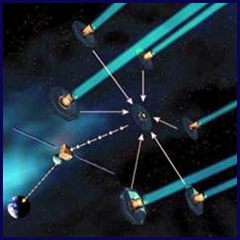
- Robotic swarm coordination
- Motion control
- Multi-vehicle systems
- Virtual holonomic constraints
- Formation control of nanosatellites
Researchers
Broucke, M., Maggiore, M., Scardovi, L.
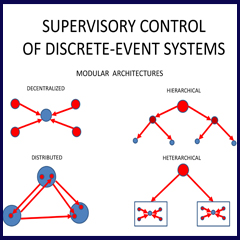
- Discrete-event systems
- Hybrid systems
- Fault detection
- Control for complex specifications
- Reach control
Researchers
Broucke, M., Kwong, R.
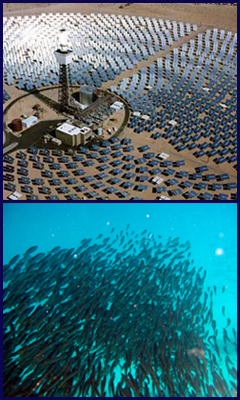
- Adaptive dynamic networks
- Extremum-seeking control
- Systems biology
- Patterned linear systems
- Decentralized control
- Large-scale systems
- Control in optical communication networks
- Synchronization
- Biochemical networks
Researchers
Broucke, M., Maggiore, M., Pavel, L., Scardovi, L., Davison, E.J.
ECE Research Centres & Networks
Who we are
The University of Toronto Electric Vehicle (UTEV) Research Centre is a university-industry partnership focused on the development of groundbreaking technologies for electric vehicles (EVs). UTEV is led by Professors Trescases and Lehn in The Edward S. Rogers Sr. Department of Electrical & Computer Engineering with multi-disciplinary collaborations with professors from the Department of Mechanical and Industrial Engineering (MIE) and the U of T Institute for Aerospace Studies (UTIAS). UTEV was launched in 2016 with five years of major infrastructure and project funding from the founding industry partner, Havelaar Canada.
UTEV is currently deploying state-of-the-art high-power test infrastructure for battery management and power electronics prototype development. UTEV will establish a global hub for advanced EV research in the heart of Canada’s largest and most innovative city. All companies, faculty members and students with an interest in electric mobility are invited to join and collaborate with UTEV.
What we do
The core technical focus of UTEV is on:
Power electronic converters for EV drivetrains
Novel power electronic converters enable the connection of energy sources to the systems and motor of the EV. Thus, they are a crucial component and can have a substantial impact on functionality and range of EVs.
Charging infrastructure
A charging infrastructure is required for the widespread adoption of EVs. This demands development in both charging stations and on-board chargers, which can be leveraged for grid support applications to improve customer value. Furthermore, the battery of the EV can be utilized for active power support on an unprecedented scale.
Energy storage for EVs
Energy storage is a key component to EVs, and advanced development in this area is key to widespread adoption of EVs. Advancing battery pack technology will increase lifetime, and unlock additional capacity without compromising safety.
Autonomous operation of EVs
The electrification of cars provides a natural platform for autonomous vehicle development. Careful integration of autonomous operation can improve EV performance while also improving vehicle safety.
Contact us
Professor Olivier Trescases
Email: ot@ece.utoronto.ca
Phone: (416) 978-2274
Office: SF 1020A
Professor Peter Lehn
Email: lehn@ecf.utoronto.ca
Phone: (416) 946-5355
Office: SF 1021J
Who we are
The Centre for Applied Power Electronics (CAPE) in The Edward S. Rogers Department of Electrical & Computer Engineering at the University of Toronto is focused on RD&D thrusts of power electronic apparatus and controls for electric power system applications. CAPE’s mission is to provide state-of-the-art infrastructure and skilled personnel to facilitate university-industry collaborative research and development projects.
CAPE’s R&D focus is the modernization of legacy electric power grids through the integration of i) renewable generation and energy storage, microgrids and high-voltage direct-current (HVDC) grids; and ii) utilization of wide area control and protection strategies.
What we do
Grid-integration of renewable resources
This subject encompasses R&D associated with i) grid integration of solar-PV power plants and wind power plants in the legacy power grid, with a focus on control and counter-measures to address impacts of indeterminacy and high-depth of penetration of renewable generation; and ii) grid-integration of utility-class energy storage.
HVDC transmission systems
This subject deals with control and operational aspects of HVDC converters, links and grid, with a focus on i) HVDC applications to off-shore wind power; ii) control and operation of HVDC grid; and iii) integration of HVDC grid and links in interconnected AC systems.
Microgrid
This R&D area deals with operation, control and protection of AC and DC microgrids and focuses on R&D of i) control of distributed generation and energy storage in microgrids; ii) supervisory control and energy management systems of microgrids; iii) off-grid (remote); and iv) operational/control strategies of multi-microgrids.
Grid-level battery storage
This R&D area addresses control, protection and energy management of grid-level battery for transmission and distribution systems, such as fast EV-charging systems, peak-power management and smoothing intermittency.
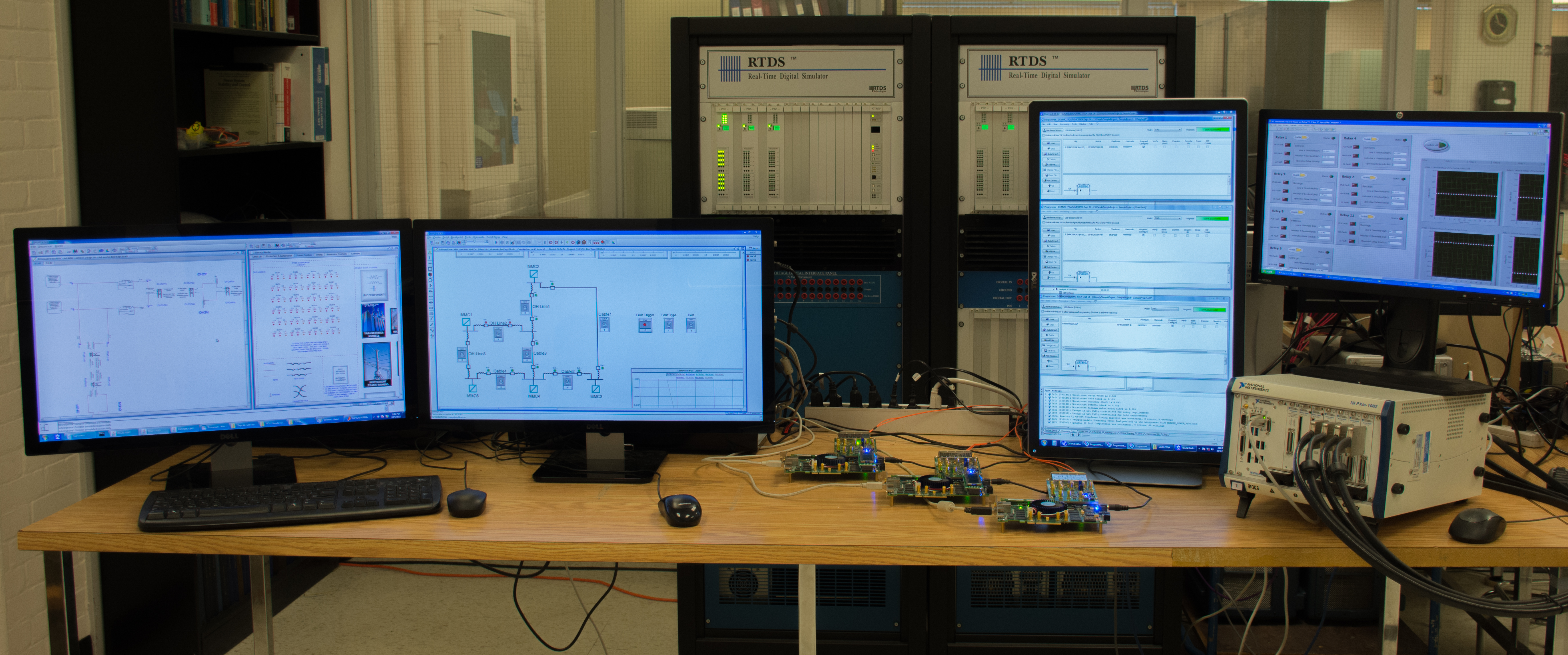
Core faculty
R. Iravani
Z. Tate
A. Yazdani
Senior Research Associates
Dr. Milan Graovac milan.graovac@utoronto.ca
Dr. Ali Nabavi nabavi.niaki@utoronto.ca
Mr. Xiaolin Wang xiaolin.wang@utoronto.ca
The NSERC Strategic Network for Smart Applications on Virtual Infrastructure (SAVI) is a partnership of Canadian industry, academia, research and education networks, and high-performance computing centres to investigate key elements of future application platforms. The main research goal of the SAVI Network is to address the design of a future applications platform built on a flexible, versatile and evolvable infrastructure that can readily deploy, maintain and retire the large-scale, possibly short-lived, distributed applications that will be typical in the future applications marketplace.
SAVI will design a national distributed application platform testbed for creating and delivering Future Internet applications. The SAVI testbed will provide flexible, virtualized converged infrastructure to support experimental research in application-oriented networking, cloud computing, integrated wireless/optical access networks, and Future Internet architectures. The testbed will also support experimentation in applications built on advanced services that provide intelligence through analytics and advanced media processing.
The SAVI Network will help advance Canada’s digital economy strategy by strengthening the industrial base in information and communications technology (ICT) through the active participation of its partners in the research program as well as the preparation of highly qualified manpower with expertise in the design and operation of globally competitive ICT infrastructure and the creation of innovative and disruptive products, services, and applications.
Research
There are currently massive efforts are underway in Europe, Japan, Korea, Australia and the United States to replace the current Internet structures using a “Clean Slate” approach. The motive for these initiatives is simple and it is to compete in the ICT sector by 2020, beginning with major changes in 2015. So what is going to change? Today’s Internet has many constraints and challenges that have to be addressed in this clean slate approach. The following are cited as the big drivers for major change:
- Massive capacity growth. Capacity is expected to increase 1000x between now and 2020.
- Heterogenous Internet-connected devices. Huge changes in heterogeneity with some devices discharging a few bits per day (sensors) to terabits per second (8G Cinema).
- Internet security. This is a major issue with solutions ranging from a fortress-like core structure to a fully distributed authentication service.
- Internet storage. We now store on the Internet as much as we take from it. The networks that provide access to the Internet have not been designed for balanced uplink and downlink traffic.
- Mobile vs. fixed devices. Mobility and mobile devices will vastly outnumber fixed Internet devices. This imbalance has already occurred and by 2020, the most conservative estimates show a growth from 5B devices today to 100B + devices by 2020.
- Device payloads. Current 3/4G mobile phones, fixed at a rate less than 50Mbps, really strain the cell design. Techniques like MIMO are used to help make cells more efficient. In five years we will see devices with 200Mbps+ downlink and uplink capacity. Current cell structure and backhaul arrangements will not cope.
- Improved power efficiency. The emergence of power efficiency at the physical and logical levels will gain much more importance over this time period. Nano-datacenters is one Euro Zone project that addresses this power and “green” concern.
- Improved energy efficiency. Cloud computing with very high energy efficiency is a driving force to reduce IT costs for many enterprises. Securing availability and the so-called “Edge of the Cloud” are critical enablers.
- Increased optical capacity. From today’s 100GE we can foresee 500GE by 2015 as a deterministic traffic flow. Again, much more emphasis will be placed on energy efficiency and today’s adherence to packets will change and routing will take on a different role. Deterministic traffic will be treated as such and the only routed traffic will be non-deterministic in nature and have routing schemes that replace today’s IP and packet-based architectures.
There are many more drivers, but those above provide a good background on research that Canadian institutions need to embrace if we are to take part in the Future Internet as a leader in some key fields.
The SAVI research program will limit its scope to aspects that are central to future application platforms and that address key challenges to network and service providers. In particular, SAVI will target the following key areas in the Future Internet:
- Wireless access in the 2015-2020 timeframe
- Novel methods of optical backhaul including radio-based methods in the optical domain
- Extension of cloud computing to include infrastructure in a service provider smart edge
- Control and management systems to enable experimentation with application platforms and Future Internet alternatives that can position Canada as a new leader in this emerging sector
- Clean and low-energy infrastructure
- Application enablement leveraging very-high bandwidth access and services in a smart edge.
People
Theme 1: Smart Applications
- Baochun Li (lead), The Edward S. Rogers Sr. Department of Electrical & Computer Engineering
- Hausi Müller, University of Victoria
- Eleni Stroulia, University of Alberta
- Roch Glitho, Concordia
Theme 2: Extended Cloud Computing
- Marin Litoiu (lead), York University
- John Chinneck, Carleton University
- Kenneth Salem, University of Waterloo
- Murray Woodside, Carleton University
- Michael Smit, Post-Doctoral Fellow, York University
Theme 3: Smart Converged Edge
- Raouf Boutaba (lead), University of Waterloo
- Paul Chow, The Edward S. Rogers Sr. Department of Electrical & Computer Engineering
- Yashar Ganjali, University of Toronto
- Alberto Leon-Garcia, The Edward S. Rogers Sr. Department of Electrical & Computer Engineering
- Majid Ghaderi, University of Calgary
- Carey Williamson, University of Calgary
Theme 4: Integrated Wireless/Optical Access
- Leslie Rusch (lead), Laval University
- Tho LeNgoc, McGill University
Theme 5: SAVI Application Platform Testbed
- Alberto Leon-Garcia (lead), The Edward S. Rogers Sr. Department of Electrical & Computer Engineering
- Raouf Boutaba, University of Waterloo
- Paul Chow, The Edward S. Rogers Sr. Department of Electrical & Computer Engineering
- Yashar Ganjali, University of Toronto
- Baochun Li, The Edward S. Rogers Sr. Department of Electrical & Computer Engineering
- Marin Litoiu, York University
- Leslie Rusch, Laval University
- Sudhaker Ganti, University of Victoria
- Hadi Bannazadeh, SAVI Architect, The Edward S. Rogers Sr. Department of Electrical & Computer Engineering
Who we are
The Centre for Power and Information (CPI) is a multidisciplinary centre situated in The Edward S. Rogers Department of Electrical & Computer Engineering at the University of Toronto focused on R&D thrusts related to future power grids. CPI’s mission is to address pressing societal energy issues at an infrastructural level through fundamental research, industry collaboration, and education, both locally in Ontario and worldwide. Under the University of Toronto’s strategic vision, CPI is comprehensively focusing on modern problems in power systems, including renewable integration, cyber-physical security and demand response.
What we do
- Cyber-physical security. Recent events have demonstrated that cyber‐physical infrastructures are vulnerable to cascading failures and adversarial attacks. New approaches are necessary for holistically monitoring, detecting, and mitigating disturbances and designing for system resilience.
- Renewable integration. Renewables are essential to our environmental and energy security. Renewable intermittency creates supply and demand imbalances, necessitating new flexibility from energy storage and controllable loads.
- Data analytics and privacy. Smart meters and synchrophasors provide an abundance of high‐resolution measurements, enabling precision forecasting and control. Careful algorithmic strategies can harness the benefits of new sensing capabilities without compromising consumer privacy.
- Power electronic converters and electric vehicles. Power electronic converters enable the seamless interconnection of wind and solar farms, energy storage, and direct current transmission lines.
Our goal
- To strengthen our leadership in energy and power systems in Canada and worldwide
- To facilitate partnerships with the power and information-technology industries
- To enhance collaboration with researchers at other institutions
- To pursue fundamental research on the most challenging issues in power systems
- To provide interdisciplinary education in power systems and information technology
Where we lead
CPI leads research and innovation in:
- Wind and solar integration
- Cyber-physical security and privacy
- Energy storage planning and control
- Demand response
- Communications for power systems
- Electricity markets and power system economics
- Direct-current transmission and microgrids
- Control and optimization
Core faculty
Iravani M R
Kundur D
Lehn P W
Liang B
Seethapathy R
Tate Z
Taylor J
Trescases O
Recent recognition
Best Paper Award, 2015 IEEE Conference on Smart Grid Communications
- A. Farraj, E.M. Hammad, D. Kundur. 'A Systematic Approach to Delay-Adaptive Control Design for Smart Grids'.
Best Paper Award, 2015 IEEE Electrical Power and Energy Conference
- D. Lee and D. Kundur. 'An Evolutionary Game Approach to Predict Demand Response From Real-Time Pricing'.
Connected Vehicles and Smart Transportation (CVST) is an ORF-funded university-industry-government partnership. The goal of the CVST project is to build a flexible and open application platform that integrates advanced wireless and sensor communications with mobile computing techniques in a cloud-based infrastructure. This platform can be used to create pervasive smart management applications to improve the safety and efficiency of public transportation. To this end, CVST builds a sophisticated data processing middleware to account for one of the major challenges in ITS systems, data mining to assist smart applications. The CVST platform is also intended to support novel applications that assist users with their travel decision-making.
Research
CVST project is launched to help tackle existing challenges in Intelligent Transportation Networks (ITS) by means of smart infrastructure to create connected vehicles. In a high-level view, the project tries to achieve three major objectives:
- Objective 1: To create an open and flexible applications platform for CVST systems that leverages emerging and future sensor, wireless communications, and cloud computing technologies.
- Objective 2: To create large-scale smart management applications on the CVST platform that will improve safety and efficiency in the publicly-operated intelligent transportation systems and promote sustainable and green transportation.
- Objective 3: To create and develop novel applications that leverage the CVST platform and that can be offered by the private sector for connected vehicle environments.
People
Alberto Leon-Garcia — Scientific Director
Hans-Arno Jacobsen — Professor, The Edward S. Rogers Sr. Department of Electrical & Computer Engineering
Baher Adbulhai — Professor, Civil Engineering
Marin Litoiu — Professor, Computer Science, York University
Ali Tizghadam — CVST Project Coordinator
The Identity, Privacy and Security Institute (IPSI) at the University of Toronto is dedicated to developing new approaches to security that maintain the privacy, freedom and safety of the individual and the broader community.
Established in the summer of 2007, the Institute strives to facilitate linkages between the diverse body of researchers working in this area at University of Toronto and the national and international community. Its founding partners are The Edward S. Rogers Sr. Department of Electrical & Computer Engineering, and the Faculty of Information.
IPSI is funded by the University of Toronto's Academic Initiatives Fund.
Research
IPSI is currently pursuing 12 main research projects:
- Biometric User-Centric Sensory Networks (BUSNET)
- Access Control based on Content Encryption and Secret Sharing (ACCESS)
- Participation in “MUSES_SECRET: Multimodal-SurvEillance System for SECurity-RElaTed Applications”
- "Smart" Private Eyes in Public Places? Video Surveillance Analytics, New Privacy Threats and Protective Alternatives
- A Privacy Protective 'Proportionate ID Digital Wallet' for Canadians: Open Prototyping and Public Policy Alternatives
- The New Transparency: Surveillance and Social Sorting
- Performing IDentities
- SmartData: Make the Data 'Think' for Itself: Data Protection in the 21st Century
- Health Promotion in the Age of Social Networks: Youth Perspectives on New Media for Health
- Beyond Privacy: Exploring the Role of Psychological Contract Breach in the Relationship Between Knowledge-Based Marketing Practices and Attitudes
- Biometrics Encryption for Face Recognition Solutions: Implementation & Comparative Evaluations
- Food4Health Project: Youth Voices Research Group
People
Dimitris Hatzinakos, Chair and Academic Director. The Edward S. Rogers Sr. Department of Electrical & Computer Engineering
Kostas Plataniotis, Research Director. The Edward S. Rogers Sr. Department of Electrical & Computer Engineering
David J. Phillips, Policy Director. Faculty of Information, University of Toronto
